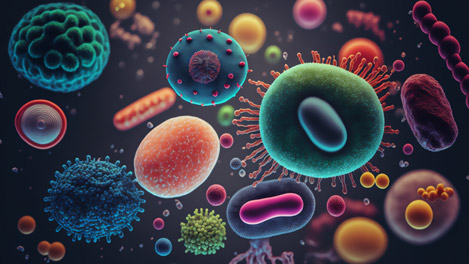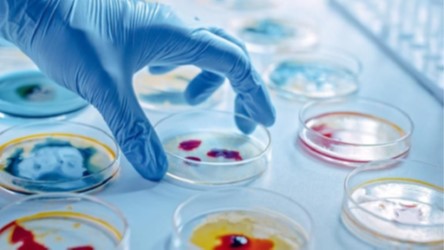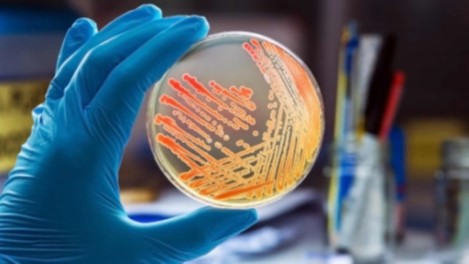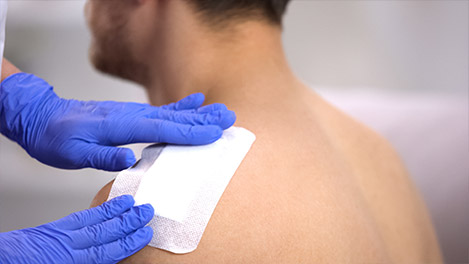SMA Specialty Medical Lab – Routine Microbiology Services

The Clinical Microbiology Laboratory at SMA offers full-service diagnostic testing in bacteriology and molecular epidemiology. Our laboratory provides timely, accurate, and medically relevant results to aid in the evaluation, diagnosis, and treatment of infectious diseases
In addition to our clinical services, we continually research, evaluate, and implement new diagnostic approaches that can improve test accuracy, reduce turn-around time, and benefit patient care.
Identification(ID) and Antimicrobial Susceptibility Testing (AST)
Physicians rely heavily on the accuracy and prompt turn-around-time of antimicrobial susceptibility test (AST)results in order to treat patients with serious infections. Our lab process and test specimens under optimal conditions and able to test the latest antimicrobial agents.
Testing capabilities in the Clinical Microbiology Lab include a variety of stain and microscopic morphologic identification, culture methods, and phenotypic and genotypic identification methods.

State-of-the-art, automated instrumentation is used to delivers gold-standard accuracy for microorganism identification and susceptibility testing and delivers accurate emerging resistance detection for the toughest pathogens, including ESBL,VISA,VRSA and MRSA.
Urine culture

Bacterial infections such as urinary tract infections (UTIs) negatively affect over 150 million individuals globally each year. Urinary tract infections (UTI) are one of the leading causes of infections in the United States. UTIs are one of the most common nosocomial infections, accounting for 35% to 40% of all hospital-acquired infections. One of the most common nosocomial infections is catheter-associated UTI , each year, accounting for over 1 million cases in hospital and nursing home patients. A urine culture is the gold standard test for revealing the causative microorganism for a UTI.
Urine culture, Routine
Semiquantitative culture to isolate and identify bacterial causes of urinary tract infection. Detect up to two pathogenic bacterial organisms at levels above 10,000 cfu/mL
| Test Code: 6400 | Urine Culture, Routine |
| Performing Lab: | SMA Specialty Medical Lab |
| TEST INCLUDES | Culture; quantitation, isolation, identification , and susceptibility testing of up to two organisms at >10,000 colonies/mL if culture results warrant . CPT coding for microbiology procedures often cannot be determined before the culture is performed |
| Reference Ranges: | n/a |
| n/a | |
| Volume | To minimum fill line (4 mL) on Vacutainer® gray-top urine culture transport tube with preservative (preferred). |
| Specimen | Urine |
| container | Vacutainer® gray-top urine culture transport tube with preservative (preferred). If less than 4 mL of urine is collected, usually from pediatric and geriatric patients or from a catheter, submit refrigerated in a sterile, screw cap container or tube. Do not submit low volume urine specimens in underfilled gray top tubes |
| Collection | Clean catch mid-stream collection. First morning specimens yield highest bacterial counts from overnight incubation in the bladder, and are the best specimens |
| Transport Temperature: | Room Temperature or refrigerated for preserved urine, for unpreserved urine must be referigerated (must be shipped with cold packs) |
| Specimen Stability: | Preserved: Room temperature for 48 hours |
| Unpreserved: Refrigerated for 24 hours | |
| Causes for Rejection | Unrefrigerated, unpreserved specimen greater than two hours old; unlabeled specimen or name discrepancy between specimen and request label; specimen in expired transport container; specimen received after prolonged delay (usually more than 48 hours for urine); specimen collected from a Foley catheter bag; specimen in nonsterile or leaking container |
| Methodology: | Culture. |
| Setup Days: | Monday – Sunday |
| Setup Times: | Day Shift |
| Turnaround: | 48 hours to several days |
| CPT Code(s): | 87086 |
| (The CPT codes provided are based on AMA guidelines and are for informational purposes only. CPT coding is the sole responsibility of the billing party. Please direct any questions regarding coding to the payer being billed.) | |
| use | Semiquantitative culture to isolate and identify bacterial causes of urinary tract infection. Detect up to two pathogenic bacterial organisms at levels above 10,000 cfu/mL |
Urine culture, Comprehensive
Semiquantitative culture to isolate and identify bacterial causes of urinary tract infection. Isolate and identify bacteria present in low numbers in the urinary tract. Detect up to three pathogenic bacterial organisms at levels down to 100 cfu/mL.
| Test Code: 6410 | Urine Culture, Comprhensive |
| Performing Lab: | SMA Specialty Medical Lab |
| TEST INCLUDES | Culture; quantitation, isolation, identification , and susceptibility testing of up to three organisms down to 100 cfu/ml colonies/mL. CPT coding for microbiology procedures often cannot be determined before the culture is performed |
| Reference Ranges: | n/a |
| n/a | |
| Volume | To minimum fill line (4 mL) on Vacutainer® gray-top urine culture transport tube with preservative (preferred). |
| Specimen | Urine |
| container | Vacutainer® gray-top urine culture transport tube with preservative (preferred). If less than 4 mL of urine is collected, usually from pediatric and geriatric patients or from a catheter, submit refrigerated in a sterile, screw cap container or tube. Do not submit low volume urine specimens in underfilled gray top tubes |
| Collection | Clean catch mid-stream collection. First morning specimens yield highest bacterial counts from overnight incubation in the bladder, and are the best specimens |
| Transport Temperature: | Room Temperature or refrigerated for preserved urine, for unpreserved urine must be referigerated (must be shipped with cold packs) |
| Specimen Stability: | Preserved: Room temperature for 48 hours |
| Unpreserved: Refrigerated for 24 hours | |
| Causes for Rejection | Unrefrigerated, unpreserved specimen greater than two hours old; unlabeled specimen or name discrepancy between specimen and request label; specimen in expired transport container; specimen received after prolonged delay (usually more than 48 hours for urine); specimen collected from a Foley catheter bag; specimen in nonsterile or leaking container |
| Methodology: | Culture. |
| Setup Days: | Monday – Sunday |
| Setup Times: | Day Shift |
| Turnaround: | 48 hours to several days |
| CPT Code(s): | 87086 |
| (The CPT codes provided are based on AMA guidelines and are for informational purposes only. CPT coding is the sole responsibility of the billing party. Please direct any questions regarding coding to the payer being billed.) | |
| use | Semiquantitative culture to isolate and identify bacterial causes of urinary tract infection. Isolate and identify bacteria present in low numbers in the urinary tract. Detect up to three pathogenic bacterial organisms at levels down to 100 cfu/mL |
Wound Culture (Aerobic & Anaerobic with gram stain)

Wound infection is a major challenge in wound care. It is often defined as a complex phenomenon in which microorganisms outcompete the host immune system and therefore are able to invade, disseminate and cause further damage to the wound and its surrounding tissues Wound infection does not only delay wound healing; it can also cause hospitalization and, in the worst cases, sepsis leading to death.
Early and accurate detection of wound infection enables the start of appropriate treatment in a timely manner and prevents further complications. On the other hand, the ability to accurately rule out infection prevents unnecessary use of antibiotics.
| Test Code: 6401 | Wound Culture, (Aerobic and Anerobic) |
| Performing Lab: | SMA Specialty Medical Lab |
| TEST INCLUDES | Gram stain, isolation, and identification of potential anaerobic and aerobic pathogens; susceptibility testing if culture results warrant. CPT coding for microbiology procedures often cannot be determined before the culture is performed |
| Reference Ranges: | n/a |
| n/a | |
| Volume | Swab |
| Specimen | Pus or other material properly obtained from an abscess aspirate, drainage, exudate, lesion, or wound. To ensure proper growth of organisms place swabs/specimen in E-swab. Do not refrigerate. |
| container | Aerobic/anaerobic bacterial swab transport copan transystem and ESwab™ transport |
| Collection | Clean catch mid-stream collection. First morning specimens yield highest bacterial counts from overnight incubation in the bladder, and are the best specimens |
| Transport Temperature: | Room Temperature |
| Specimen Stability: | Room temperature for 48 hours |
| Causes for Rejection | Unlabeled specimen or name discrepancy between specimen and test request label; specimen not received in appropriate anaerobic transport tube: or ESwab™ transport; swab not stored in oxygen-free atmosphere; specimen refrigerated; specimen received after prolonged delay in transport (usually more than 48 hours). Note: Refrigeration inhibits viability of certain anaerobic organisms. Specimens from sites that have anaerobic bacteria as indigenous flora will not be cultured anaerobically (eg, throat, feces, colostomy stoma, rectal swabs, bronchial washes, cervical-vaginal mucosal swabs, sputa, skin and, voided or catheterized urine, ulcer surfaces, drainages onto contaminated surfaces). |
| Methodology: | Anaerobic and aerobic culture and Gram stain smear |
| Setup Days: | Monday – Sunday |
| Setup Times: | Day Shift |
| Turnaround: | 48 hours to several days |
| CPT Code(s): | 87070, 87075 |
| (The CPT codes provided are based on AMA guidelines and are for informational purposes only. CPT coding is the sole responsibility of the billing party. Please direct any questions regarding coding to the payer being billed.) | |
| use | Isolate and identify potentially pathogenic aerobic and anaerobic organisms. Susceptibility test is performed at additional charge when organisms isolated meet microbiologic criteria for clinical significance. |
Throat Culture
| Test Code: 6502 | Throat Culture |
| Performing Lab: | SMA Specialty Medical Lab |
| TEST INCLUDES | Isolation and identification of potential aerobic pathogens; susceptibility testing if culture results warrant. CPT coding for microbiology procedures often cannot be determined before the culture is performed. |
| Reference Ranges: | Normal Flora |
| Volume | 1 Swab |
| Specimen | Throat Swab |
| container | ESwab™ (white cap) |
| Collection | 1. Depress tongue with tongue depressor
2. Sample the posterior pharynx, tonsils, and inflamed areas with a sterile swab 3. Place swab in transport medium |
| Transport Temperature: | Room Temperature |
| Specimen Stability: | 48 hours |
| Causes for Rejection | Expired transport device; frozen specimen; request for anaerobic culture; refrigerated specimen; dry swab; viral transport media. Unlabeled specimen or name discrepancy between specimen and request label. |
| Methodology: | Culture |
| Setup Days: | Monday – Sunday |
| Setup Times: | Day Shift |
| Turnaround: | 2 to 4 days |
| CPT Code(s): | 87070, 87077, 87185, 87186 |
| (The CPT codes provided are based on AMA guidelines and are for informational purposes only. CPT coding is the sole responsibility of the billing party. Please direct any questions regarding coding to the payer being billed.) | |
| Use | Isolation, identification, and, if necessary, antimicrobial susceptibility testing, of aerobic bacteria considered pathogenic in the upper respiratory tract. Susceptibility test is performed at additional charge when organisms isolated meet microbiologic criteria for clinical significance. |
Methicillin-Resistant Staphylococcus Aureus (MRSA) Colonization Screening Culture
| Test Code: 6503 | Methicillin-Resistant Staphylococcus Aureus (MRSA) Culture |
| Performing Lab: | SMA Specialty Medical Lab |
| TEST INCLUDES | This test is intended only for screening for MRSA colonization and is not intended to diagnose MRSA infection or to guide or monitor treatment for infection. |
| Reference Ranges: | No growth |
| Volume | 1 Swab |
| Specimen | Swab specimen of anterior nares, axilla, or groin |
| container | ESwab™ (white cap) |
| Collection | Nares: Insert swan into one anterior naris. Apply slight pressure to the nostril and rotate swab to sample the inside surface. Insert the same swab into the other naris and repeat. Place swab into swab transport tube.
Axilla, groin: Swab the surface of the superficial skin area. Place swab into swab transport tube. |
| Transport Temperature: | Room Temperature |
| Specimen Stability: | 48 hours |
| Causes for Rejection | Specimen received without proper identification; inappropriate specimen transport device; unlabeled specimen or name discrepancy between specimen and request label; specimen received after prolonged delay (usually more than 48 hours); expired transport device. |
| Methodology: | Culture |
| Setup Days: | Monday – Sunday |
| Setup Times: | Day Shift |
| Turnaround: | 24 to 48 hours |
| CPT Code(s): | 87081 |
| (The CPT codes provided are based on AMA guidelines and are for informational purposes only. CPT coding is the sole responsibility of the billing party. Please direct any questions regarding coding to the payer being billed.) | |
| Use | Screen for Methicillian-Resistant Staphylococcus Aureus (MRSA) colonization of patients. |
